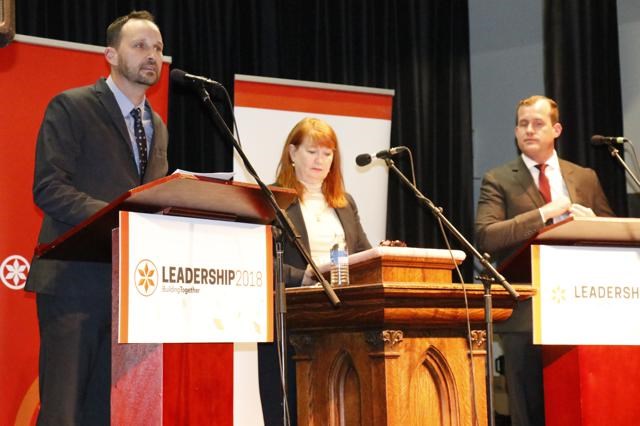By Greg Nikkel
The two candidates vying for the leadership of the Saskatchewan New Democrats held a debate in Weyburn, discussing how they would make changes in policy and finances if they led their party back to power in Saskatchewan.
Ryan Meili, who was elected in a byelection in Saskatoon this past spring, debated the issues against rival Trent Wotherspoon at the historic former church of party founder and former premier Tommy Douglas, a point that both candidates made reference to during the evening.
The auditorium of the T.C. Douglas Centre was mostly full with around 75 local residents on hand for the debate, moderated by Nancy Styles.
“People are sick of the same old politics. They want a change. We’ve always been a party of leaders,” said Meili in his opening statement, who suggested that to be successful, the NDP needs to talk about not just what they oppose, but what they are proposing to do if they are elected to power.
He is proposing a $15-an-hour minimum wage and a role in providing “real reconciliation” with First Nations and Metis peoples, and said, “It’s time to move beyond opposition to a position of leadership.”
Wotherspoon noted “this is a critical time for our party” as he set out his positions, stating, “The Sask Party have been removing many of the things that give us strength. It’s becoming clear they don’t just have a deficit of dollars, but a deficit of decency.”
He agreed with the proposal for a $15/hr. minimum wage, and added that if elected under his leadership, the NDP will institute universal coverage for mental health services, and a $15 a day universal child care system along with protecting and expanding the Crown corporations, including entrenching protection in the province’s constitution.
Styles opened with the issue of the legalization of marijuana, and asked both candidates for their stance on how the province should handle that.
“It’s important we get this right. I think it’s important we keep the revenues in the province,” said Wotherspoon, adding it’s important that the province lay out the regulations for how the industry will operate in Saskatchewan, including that it be sold separately from the province’s liquor stores.
Meili said his feeling is that Saskatchewan-based companies should supply it in this province, and hoped that it won’t be monopolized by major corporations coming in to sell the product.
He also felt that Saskatchewan could learn from the states of Colorado and Oregon, as they have some experience with controlling the sale of marijuana, including very strict rules about how and who can buy it.
In answer to other questions brought forward, both candidates felt that adding the PST to insurance coverage was a bad idea, as it hurts the agricultural sector in particular, such as when they get crop insurance or hail insurance to protect their crops.
Meili noted he grew up on a farm southwest of Moose Jaw, and feels that the Sask Party is taking rural areas for granted, so “there’s a lot of room for us to grow.”
“It’s key for us to build back that trust,” added Wotherspoon. “This is something I’ve committed significant time and effort to in the last decade.”
He feels the PST on insurance hits the ag sector particularly hard as it is taking a lot of money out of rural areas when they can least afford it.
A question was raised about the importance of addressing climate change and building a green economy in this province. Wotherspoon said the province cannot allow the federal government to impose a plan on Saskatchewan, and noted Alberta is growing their economy under the NDP, so it is possible to follow their lead in this province.
“We need to make sure we’re protecting agricultural producers, who are stewards of the environment, and we need to reduce emissions, which can create jobs by investing in renewable resources here,” he said.
“You might get the sense we spend a lot of time together,” quipped Meili, who agreed with much of what Wotherspoon said on this topic.




